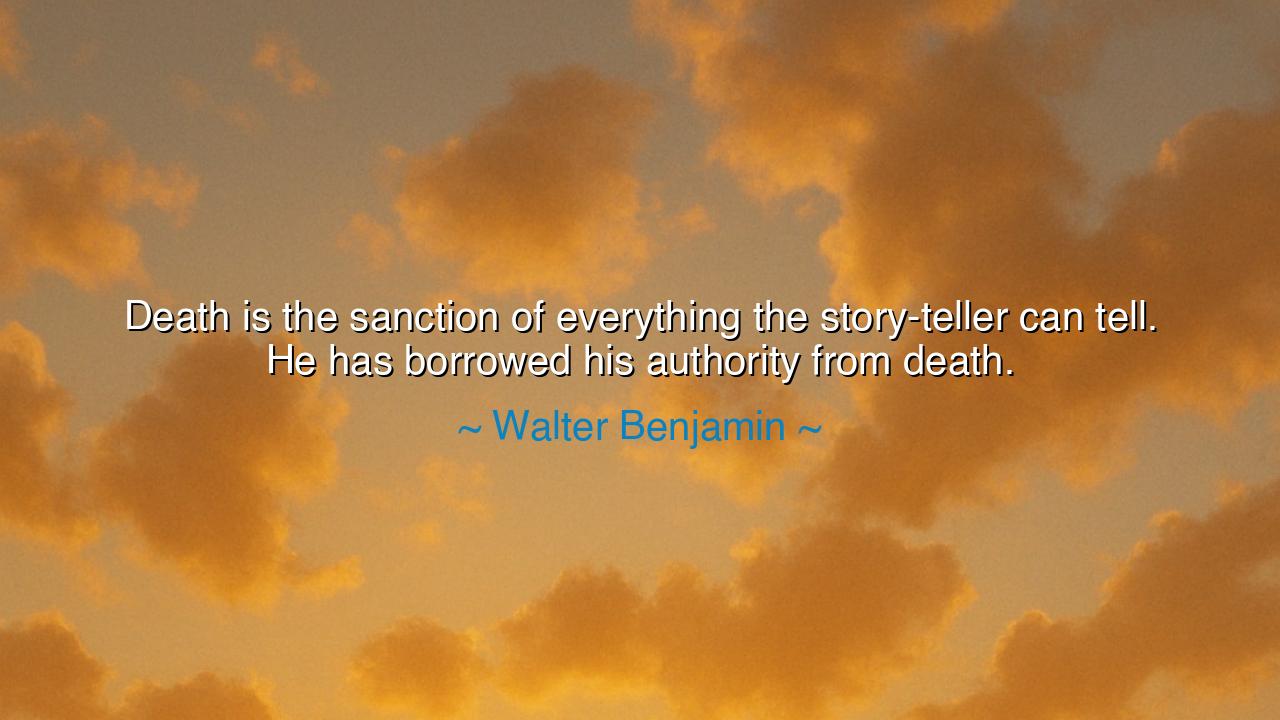
Death is the sanction of everything the story-teller can tell. He
Death is the sanction of everything the story-teller can tell. He has borrowed his authority from death.






"Death is the sanction of everything the story-teller can tell. He has borrowed his authority from death." So wrote Walter Benjamin, the philosopher of shadows and echoes, who saw in stories not mere entertainment, but the echo of mortality. His words remind us that the power of the storyteller comes not from the living moment alone, but from the vast stillness that surrounds it—the silence of those who have come and gone. For every tale, no matter how bright, is measured against the dark certainty of death; and it is from that certainty that stories draw their gravity, their truth, their sacred weight.
In the ancient world, the storyteller was both priest and prophet. Around the fire he spoke of heroes who fell and gods who vanished, of kingdoms risen and broken. The listeners felt in his words the breath of eternity. For what makes a story endure? It is not the laughter of the moment, nor the thrill of the telling, but the awareness that what is told will outlive its teller. Death confers authority because it seals the tale—it transforms experience into legacy. Without death, life would be endless motion; it is the end that gives shape to meaning.
Consider the Epic of Gilgamesh, the oldest story known to humankind. It begins with conquest and friendship, but ends with loss. When Enkidu dies, Gilgamesh is undone; he travels to the ends of the earth seeking immortality, only to find that his name, not his flesh, will endure. His journey reveals Benjamin’s truth: that stories borrow their power from mortality. The epic survives not because of Gilgamesh’s triumphs, but because of his grief, his confrontation with death. The storyteller’s authority rests in his ability to look upon that abyss and speak from its edge.
The same is true of every voice that has endured. The poet Homer sang of Achilles, who knew his death was near yet chose glory over safety. The philosopher Socrates, condemned to die, spoke with calm clarity in his final hours, giving his students a story of courage stronger than any doctrine. Even Anne Frank, whose young life was extinguished by cruelty, speaks to us through the pages she left behind—pages that pulse with life precisely because we know how her story ends. Death does not silence her; it crowns her words with immortality.
Benjamin understood that the storyteller’s task is not to deny death, but to weave it into the tapestry of existence. The story that forgets death becomes hollow, like a song with no final note. But the story that faces it gains weight, for it reminds us that time is precious, that love is fragile, that memory is sacred. Every storyteller, whether they know it or not, speaks from the inheritance of all who have gone before. In that sense, to tell a story is to commune with the dead—to borrow their wisdom, to keep their voices alive in the wind.
Thus, the quote is not a lament, but a revelation. It tells us that death is not the destroyer of meaning—it is the giver of meaning. The authority of the storyteller comes from his intimacy with impermanence, from his understanding that what fades becomes sacred in its fading. When you listen to a story, you are not merely hearing words—you are partaking in an ancient ritual of remembrance, of transformation, of resurrection through language.
The lesson, then, is this: speak and live as one who knows the brevity of life. Let your words carry the tenderness of one who has looked into the eyes of loss. When you tell your story—whether to your children, your friends, or to the pages of a journal—tell it with the humility of one who knows that one day it will be all that remains of you. Death will grant it truth, as it has granted truth to every tale that has endured.
And so, let us give thanks for the silence that frames our songs, for the shadow that shapes our light. To live fully is to speak with death at your shoulder, to craft your story with awareness of its end. Then your words, like those of the ancients, will not vanish with you—they will stand, luminous and unafraid, as your offering to eternity.






AAdministratorAdministrator
Welcome, honored guests. Please leave a comment, we will respond soon